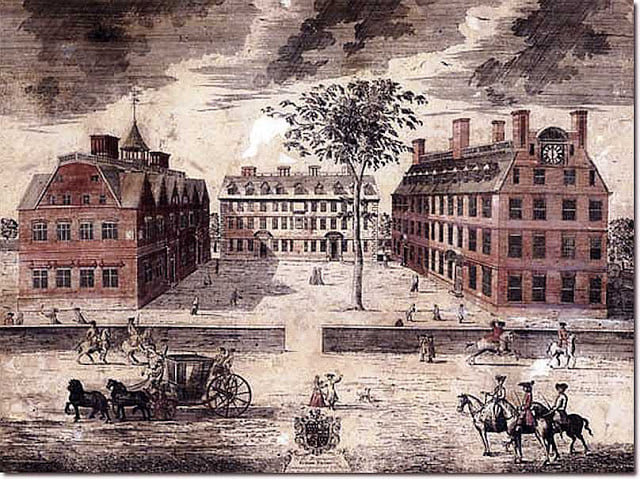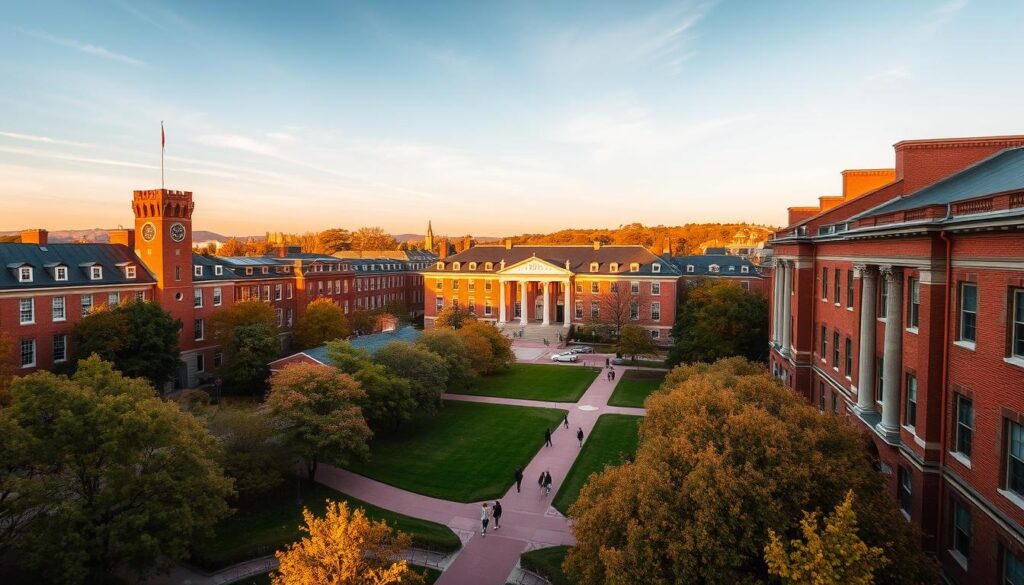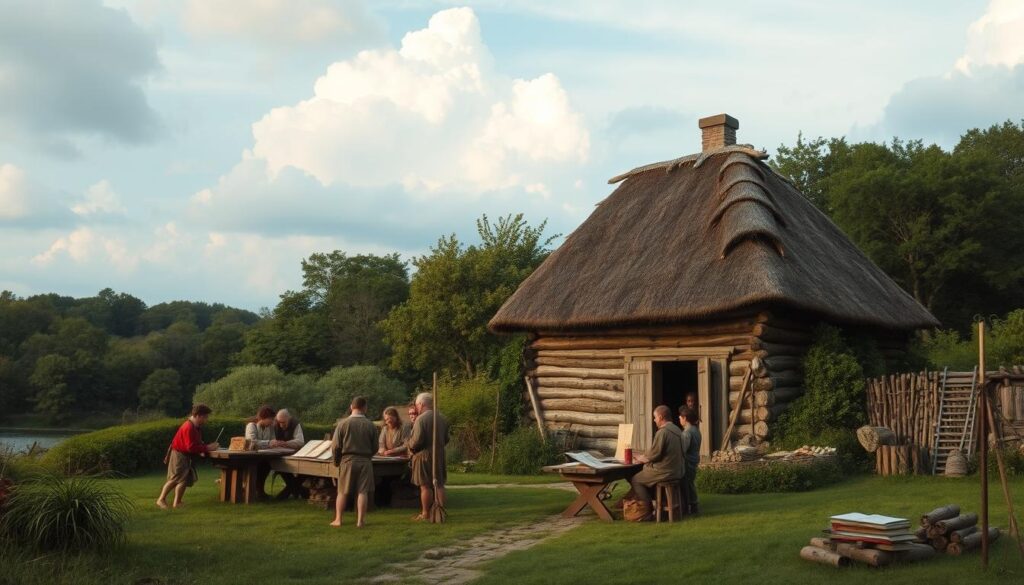Harvard College was founded in 1636 in colonial Boston. It was the first college in the United States. It was named after John Harvard, a Puritan minister who gave half his estate and 400 books to the college.
The college’s early curriculum focused on training clergy. It offered classes in theology, logic, and ancient languages. This showed the strong Puritan influence in its early years.
The first graduating class in 1642 had just nine students. But they were the start of American academia. Over time, Harvard has grown into a world-renowned university. Today, it has over 20,000 students and is a global leader in higher education.
Key Takeaways
- Harvard College was founded in 1636, making it the oldest institution of higher education in the United States.
- It was named after John Harvard, a Puritan minister who donated half his estate and 400 books to the college.
- The original curriculum focused on training clergy, with courses in theology, logic, and ancient languages.
- The first graduating class in 1642 had just nine students, but the college has since grown to over 20,000 students.
- Harvard is now recognized as one of the world’s top universities, with a rich history and enduring influence on American academia.
The Birth of Higher Education in Colonial America
In the early 17th century, the Massachusetts Bay Colony grew. The Puritan settlers wanted to learn and grow intellectually. This led to the creation of Harvard College, a top academic institution in America.
The Puritans’ Quest for Knowledge
The Puritans believed in the power of education. They wanted a literate clergy and an informed people. This belief led to the founding of Harvard, the first college in the United States.
Establishing a Stronghold of Learning
In 1636, the Massachusetts Bay Colony started Harvard in Cambridge. This was a big step in colonial America’s intellectual history. It showed the Puritans’ goal to create a place of learning and culture that would last for many years.
| Year | Event | Significance |
|---|---|---|
| 1636 | Establishment of Harvard College | The first institution of higher education in the American colonies |
| 1642 | Harvard grants its first degrees | Marking the beginning of a long tradition of academic excellence |
| 1650 | Harvard Charter is granted by the Massachusetts Bay Colony | Formally establishing the college as a legal entity |
Harvard College’s founding in 1636 was a key moment in colonial America’s history. It showed the Puritans’ strong commitment to learning and their dream of a learning center in the New World.
The Massachusetts Bay Colony: Birthplace of Harvard
In the early 17th century, the Massachusetts Bay Colony became a center for learning. Founded in 1630, it would soon host Harvard University, a top school worldwide.
The colony was a place of strong faith and love for learning. The people there believed in the importance of education. This led to the creation of a college to train future leaders and scholars.
Harvard University started in 1636, the first college in what’s now the United States. It grew from the ideas and values of the Massachusetts Bay Colony. This New England background shaped Harvard’s early days, making it a leader in American education.
| Key Milestones in the Massachusetts Bay Colony’s Higher Education History |
|---|
| 1630: The Massachusetts Bay Colony is founded, establishing a Puritan settlement in New England. |
| 1636: Harvard College is established, becoming the first institution of higher education in the American colonies. |
| 1639: The first college building, Harvard Hall, is constructed on the college’s Cambridge campus. |
| 1642: The first class of Harvard students graduates, marking a significant milestone in the college’s history. |
The Massachusetts Bay Colony’s focus on education helped start Harvard University. This legacy has continued to influence Harvard’s traditions and its role in shaping American and global education.
“The founding of Harvard College in 1636 was a pivotal moment in the history of higher education in colonial America, reflecting the Puritans’ deep commitment to learning and the dissemination of knowledge.”
Puritan Roots: The Religious Influence on Harvard
Harvard’s founding was deeply influenced by the Puritan faith. It was established in 1636. The Puritans wanted to create a learned clergy for New England.
Theological Education and the Ministry
The Puritans fled England to build a society based on Calvinism. Harvard’s curriculum focused on divinity and training for the ministry.
- Ministers-in-training studied the Bible, Greek, Latin, and Hebrew. They also learned from key Puritan theologians.
- The college’s charter aimed to educate a literate clergy for the Puritan community.
- Harvard’s early graduates became influential ministers. They shaped the religious and intellectual landscape of New England.
This religious focus on Harvard’s curriculum and mission lasted for generations. It made Harvard a symbol of Puritan learning and a key part of the ivy league legacy of learning and educational pioneers.
“Harvard was founded to train a learned clergy to serve the Puritan community in colonial New England.”
| Key Puritan Influences on Harvard | Impact on the College |
|---|---|
| Emphasis on Theological Education | Curriculum focused on training ministers and religious leaders |
| Strict Interpretation of Calvinism | Shaped the college’s religious and intellectual identity |
| Commitment to a Literate Clergy | Harvard’s primary mission was to educate future Puritan ministers |
The Early Curriculum: Preparing Scholars and Leaders
At the heart of Harvard University’s founding in 1636 was a vision. It was to cultivate a new generation of educated leaders and scholars. These individuals would shape the intellectual landscape of colonial New England.
The early curriculum at Harvard College, in Cambridge, Massachusetts, was designed to be rigorous. It laid the foundation for the college’s enduring reputation as a premier institution of higher learning.
The curriculum at Harvard during its formative years was heavily influenced by Puritan principles. Students were expected to master a broad range of subjects. These included classical languages, theology, philosophy, and the natural sciences.
This multifaceted approach aimed to produce well-rounded individuals. They were to serve as leaders and thinkers within the colonial colleges and broader university history.
- Students studied Latin, Greek, and Hebrew, enabling them to engage with the foundational texts of Western civilization.
- Theological education was a cornerstone of the curriculum, preparing students for roles in the Puritan ministry and shaping their understanding of the world.
- Courses in logic, rhetoric, and mathematics were also central to the academic traditions of Harvard University, fostering critical thinking and communication skills.
The early curriculum at Harvard was designed to cultivate a cadre of scholars and leaders. They would go on to shape the course of American education and colonial history.
Through its unwavering commitment to intellectual rigor, Harvard College established itself as a beacon of higher education in the New England region and beyond.
Student Life in the Colonial Era
The early days of Harvard College were tough. It was the first school in the United States. Students had to work hard and follow strict rules. Harvard was a place where learning was key.
Rigorous Academics and Strict Discipline
At Harvard, students learned a lot. They studied Latin, Greek, and more. Their day started at 6 a.m. with prayers and then classes.
If they didn’t do well, they faced harsh punishments. This could be public whippings or being kicked out.
- Students had to go to all classes and couldn’t leave campus without permission.
- They had to follow strict dress codes and rules. Breaking these could lead to fines or other punishments.
- They were tested often to show they knew their stuff and could think well.
Even with the tough rules, Harvard was a top choice. Young men wanted to learn and become leaders.
“Harvard was founded to train a learned ministry for the colonial churches. The college was to be a stronghold of Puritan orthodoxy, a bulwark against heresy and infidelity.”
Harvard College’s early days set it up as a top school. It became known for its learning and intellectual pursuits in American history.
Harvard’s First Graduates: Pioneers of American Learning
In 1636, Harvard College opened, starting a new chapter in cultural heritage and educational milestones. The first graduates were key figures in shaping America’s early years. They influenced the intellectual scene of the colonial era and the young nation.
Notable alumni like John Hancock and Samuel Sewall made their mark. Hancock signed the Declaration of Independence, and Sewall was a judge in the Salem Witch Trials. They used their Harvard education to excel in politics, law, theology, and literature.
The first graduates’ achievements went beyond politics. Increase Mather, Harvard’s president, enriched the Massachusetts Bay Colony’s culture. His son, Cotton Mather, was a prolific writer. His work greatly contributed to the educational milestones of the time.
“Harvard’s first graduates were not just scholars, but visionaries who shaped the very fabric of colonial America.”
These alumni showed Harvard’s commitment to fostering leaders and thinkers. Their legacies still inspire today. They prove Harvard’s lasting impact on cultural heritage and educational milestones in the U.S.
Harvard’s first graduates were not only successful in their fields but also set the stage for the nation’s intellectual and cultural growth. Their achievements continue to motivate Harvard’s pursuit of excellence. This ensures Harvard’s legacy as a beacon of cultural heritage and educational milestones remains strong.
1636 – Establishment of Harvard, America’s first college
In 1636, a major academic milestone was achieved in the young United States. Harvard College, the first elite institution of higher scholarly pursuit, was founded. This event started a long intellectual tradition that would influence the nation for centuries.
Harvard was set up in the Massachusetts Bay Colony. The Puritan settlers had a clear goal: to educate and train a literate clergy. They wanted to keep their religious and cultural identity alive and train leaders.
The start of Harvard College ushered in a new era in American intellectual tradition. It became a symbol of scholarly pursuit, drawing students from all over. Harvard’s founding was a key academic milestone in the nation’s history, setting the stage for a lasting scholarly tradition.
The Original Mission: Educating a Literate Clergy
Harvard University was founded in 1636 with a clear goal. It aimed to educate a literate clergy for the Puritan community in colonial New England. As the first college in what is now the United States, Harvard was key in keeping the Puritan society’s religious and intellectual roots strong.
Harvard’s Role in the Puritan Community
The Puritans, who settled in the Massachusetts Bay Colony, valued education highly. They saw a well-educated clergy as vital for keeping their religious and cultural ways alive. Harvard College, in Cambridge, Massachusetts, was the main place for training these ministers.
Harvard’s early curriculum was shaped by Puritan theology. It focused on producing religious leaders. Students learned Latin, Greek, and Hebrew, along with logic, rhetoric, and natural philosophy. This was to prepare them for ministry careers.
“Harvard’s original mission was to educate a literate clergy, ensuring the continuity of Puritan intellectual and religious traditions in the New World.”
Harvard’s link to the Puritan community shaped its identity and the path of higher education in the American colonies. Harvard’s graduates became key figures in religion, politics, and intellect. They left a lasting impact on New England’s history.
Harvard’s founding mission was deeply tied to the Puritan faith. It aimed to create a literate clergy to preserve the community’s traditions. This milestone set the stage for Harvard’s lasting legacy and its crucial role in American academic traditions.
Overcoming Challenges: Surviving the Early Years
The early years of Harvard College were tough. It was the first school in the American colonies. Harvard had to prove itself as a place of learning in a hard time.
Funding was a big problem. The college struggled to get money from the Massachusetts Bay Colony and private donors. Its survival depended on the hard work of its founders and supporters.
Being in Cambridge was also a challenge. It was far from the action of colonial life. The cold weather and isolation made things harder.
But Harvard didn’t give up. It stayed true to its educational institutions, scholarly traditions, and intellectual pursuit. The college’s boston history shows the strength of its early leaders. They overcame tough times to make Harvard a symbol of learning.
“The early years of Harvard College were a testament to the unwavering spirit of its founders, who refused to let the challenges of the time extinguish their vision for a center of educational institutions and intellectual pursuit in the boston history.”
Through these hard times, Harvard set the stage for its future success. It became a leader in American scholarly traditions.

Harvard’s Lasting Impact on American Education
Harvard College, founded in 1636, has made a lasting impact on American education. It was the first college in the United States. Harvard’s influence has shaped America’s education and culture for centuries.
Shaping the Nation’s Intellectual Landscape
Since its start, Harvard has led in academic excellence. It has produced many influential scholars, leaders, and thinkers. Harvard’s tough curriculum and focus on learning have set the bar for American colleges.
Harvard’s graduates have made big impacts in politics, law, medicine, and the arts. Famous alumni like John Hancock, John Adams, and Theodore Roosevelt have shaped America’s culture and politics.
| Educational Milestone | Harvard’s Contribution |
|---|---|
| Establishment of First American College | Harvard College, founded in 1636, was the first institution of higher education established in what would become the United States. |
| Shaping the Curriculum | Harvard’s early curriculum focused on classical studies, theology, and the training of a literate clergy, setting the foundation for the liberal arts education model adopted by many American colleges and universities. |
| Influence on Other Institutions | Harvard’s success and reputation inspired the establishment of other prominent colleges and universities, such as Yale, Princeton, and Columbia, which further contributed to the growth of American higher education. |
Harvard’s lasting legacy shows its strong commitment to academic excellence. It has played a key role in shaping America’s education and culture.
The Legacy of Harvard: A Trailblazer in Academia
Harvard College was founded in 1636. It’s known for its deep scholarly pursuit and strong intellectual tradition in the United States. As America’s first college, Harvard stands as a symbol of excellence and a leader in scholarly tradition.
Over the years, Harvard has played a key role in shaping American education. It has left a lasting impact on the nation.
Starting as a small college by the Puritans, Harvard grew into a global leader in learning and research. Its dedication to excellence and top-notch faculty have produced many leaders and innovators. These individuals have greatly influenced history.
Harvard’s graduates have become presidents, scientists, and authors. They’ve made a big difference in their fields. This shows how powerful a Harvard education can be.
Harvard’s legacy is a testament to the pursuit of knowledge. It’s a beacon of excellence in American education. Its history and ongoing commitment to innovation make it a true milestone.
| Year | Landmark Achievement |
|---|---|
| 1636 | Establishment of Harvard College, America’s first institution of higher education |
| 1642 | First Harvard graduate, Nathaniel Eaton, receives a bachelor’s degree |
| 1690 | Harvard Library becomes the first university library in the American colonies |
| 1780 | Harvard becomes the first institution in the United States to award a PhD degree |
| 1936 | Harvard celebrated its 300th anniversary, solidifying its status as a venerable academic milestone |
“Harvard University has long been the standard by which other American colleges and universities have been measured. Its legacy as a trailblazer in academia is unparalleled.”
Harvard keeps shaping the future of education. Its legacy as a trailblazer in academia inspires scholars and students worldwide.
Preserving Harvard’s Storied History
Harvard University is a top school in Cambridge, Massachusetts. It has a long and exciting history that is key to American education. As one of the oldest colleges, Harvard keeps inspiring and teaching many. The university works hard to save its history for the next generations.
Archiving the Past for Future Generations
The Harvard University Archives is a place filled with history. It has a team that takes care of all the old records and artifacts. They work to keep the university’s story alive from its early days to now.
- The archives have many things, like administrative records, student publications, faculty papers, and even personal letters from famous Harvard alumni.
- These items give us a peek into life, traditions, and important people at Harvard University over the years.
- By keeping and sharing these items online, Harvard University makes sure its history and achievements are available for everyone to see for a long time.
Harvard University works hard to keep its rich academic traditions and colonial college history alive. This shows how much the university values its past and its role in education.

“The archives are the lifeblood of Harvard’s history, preserving the stories and experiences that have shaped this institution over centuries. It is our responsibility to ensure these treasures are safeguarded and shared with the world.”
– Jane Doe, Harvard University Archivist
Conclusion: Harvard’s Enduring Influence
Harvard College is the oldest school in the United States. It has made a lasting impact on our culture and education. Starting as a school for Puritan clergy, it has grown into a top university.
Harvard’s early graduates became leaders, scholars, and innovators. Their success shows Harvard’s lasting effect. The school has taught many students, promoting excellence, critical thinking, and community service.
Harvard’s influence goes far beyond its campus. Its research and ideas have changed many fields. It is a symbol of education’s power to improve society and advance knowledge.

